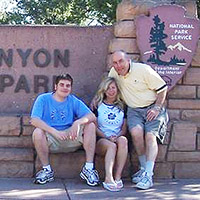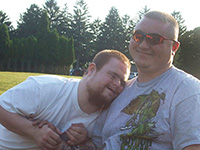Autism and Adults
Receiving a Diagnosis in Adulthood
As information about autism has become widely available, many adults have discovered that autism offers an explanation for the challenges that they have experienced throughout their lives. Some may choose to pursue a formal diagnosis for ASD.

Many adults on the spectrum find the diagnosis to be a relief, as it gives a name to the feelings of otherness that they frequently experience. Others may feel sad or angry about the diagnosis due to the social and vocational problems that are associated with the condition. Whether you are looking for a psychologist who can evaluate you for ASD, or have received a diagnosis and wonder where to go next, please contact us. Our experienced staff will be able to direct you to resources that can help, from therapists who diagnose and treat adults with ASD, to support groups for adults on the spectrum.
Autism in the Workplace
One of the most significant challenges that an adult with autism will face is finding and maintaining gainful employment. Due to difficulties with social interaction, people on the autism spectrum are often prejudged before they can prove themselves in a workplace setting. According to current estimates, the unemployment rate among adults with Asperger Syndrome and other forms of high-functioning autism is as high as 85 percent, despite their typically above-average education, intelligence, and technical aptitude.
Employment for adults with autism is possible at most levels of functioning, given the right training, support, and workplace setting. Some adults with ASD, especially those with high functioning autism or Asperger Syndrome, may be able to work successfully in mainstream jobs. Many others with ASD are capable of employment under the supervision of managers trained in working with persons with disabilities.
Even if these adults can maintain employment, communication, social problems, and difficulties in relationships will still likely be an issue that needs to be dealt with. Many adults with ASD will continue to need more support in their struggle for an independent life than people without ASD.
A nurturing environment at home, at school, and at work is essential to help people on the autism spectrum continue to learn and develop throughout their lives. It is also important for workers on the autism spectrum to have a well-developed social support structure outside of their workplace to help them handle unexpected personal problems that may affect their working schedule.
Translating Special Interests into Careers
 Many people on the autism spectrum have special interests, subjects that they are passionately focused on to the exclusion of all other topics. Many special interests can be translated into academic studies, which can lead to lifetime employment in their area of interest. It is important to start early to identify the autistic person’s special interest and select marketable trades that utilize these interests.
Many people on the autism spectrum have special interests, subjects that they are passionately focused on to the exclusion of all other topics. Many special interests can be translated into academic studies, which can lead to lifetime employment in their area of interest. It is important to start early to identify the autistic person’s special interest and select marketable trades that utilize these interests.
Ideal careers are those that are not easily outsourced and do not depend heavily on social norms. Autism spectrum disorders provide certain gifts and certain limitations that make some professions impractical but other professions ideal. People with autism need to be guided in their education to reach reasonable employment goals.
For more information on autism and employment, read Dr. Temple Grandin’s article, Choosing the Right Job for People with Autism or Asperger’s Syndrome.
Ideal Workplace Environments
In the same way that there are ideal jobs for people on the autism spectrum, there are also ideal employers and employment settings. An ideal employer is one who allows the person with ASD to focus on their work, and does not require the person to socialize with the other employees. In order for this arrangement to work, the employer needs to provide a buffer between the worker with autism and the other employees, and needs to be understanding and supportive of the person with ASD should there be a conflict with another employee.
Another issue to consider is the sensory needs of the individual with ASD. Many people on the autism spectrum have sensitivities to light, sound, and tactile sensation that may affect their ability to do productive work. Employers should be notified of these sensitivities early on so that reasonable accommodations can be made. Common accommodations include replacing an overhead florescent light with an incandescent desk lamp; moving the person to an office or cubicle that is insulated from noise; and allowing the person to wear soft, comfortable clothing instead of the standard office uniform.
Making Friends
 It is important for people with ASD to have meaningful relationships outside of their immediate family. Making friends can be difficult for people on the spectrum, but it is possible with training and practice. Please contact us to find a therapist or social skills coach who helps people with ASD learn social interaction.
It is important for people with ASD to have meaningful relationships outside of their immediate family. Making friends can be difficult for people on the spectrum, but it is possible with training and practice. Please contact us to find a therapist or social skills coach who helps people with ASD learn social interaction.
Many adults on the spectrum find it easiest to make friends with people who share their special interests, since these individuals are likely to think in similar ways and be easier to converse with. There are often clubs, organizations, and social groups for special interests that people with ASD can join to make friends.
People on the spectrum are frequently successful at making friends with other people with ASD. We sponsor social support groups for teens and adults on the autism spectrum who want to socialize, practice conversational skills, and share special interests. Many individuals in these groups have made close and lasting friendships with other group members. Please contact us to learn more about these social groups.
Living Arrangements for Adults with ASD
 The schools’ responsibility for providing services to people with autism ends when the person with ASD reaches the age of 22. The family is then faced with the challenge of finding living arrangements to match the needs of their adult child. The parents may also need to find programs and facilities that can provide the support services necessary to achieve these goals. It is essential that the parents begin these preparations long before their child finishes school. Please contact us to see what resources are available to you and your child.
The schools’ responsibility for providing services to people with autism ends when the person with ASD reaches the age of 22. The family is then faced with the challenge of finding living arrangements to match the needs of their adult child. The parents may also need to find programs and facilities that can provide the support services necessary to achieve these goals. It is essential that the parents begin these preparations long before their child finishes school. Please contact us to see what resources are available to you and your child.
Independent Living
Some adults with ASD are able to live on their own. Others can live semi-independently in their own home or apartment if they have family members or support personnel who help with the tasks of daily living. For a list of programs that help people with ASD live independently, please contact us.
Living at Home
Government funds are available for families that choose to have their adult child with ASD live at home. These programs include Supplemental Security Income (SSI), Social Security Disability Insurance (SSDI), Medicaid waivers, and other programs. Please contact us for information about these programs. An appointment with a local Social Security Administration office is a good first step to understand the programs for which the young adult is eligible.
Foster Homes and Skill-Development Homes
Some families open their homes to provide long-term care to unrelated adults with disabilities. If the home teaches self-care and housekeeping skills and arranges leisure activities, it is called a “skill-development” home.
Supervised Group Living
Persons with disabilities frequently live in group homes or apartments staffed by professionals who help the individuals with basic needs. These often include meal preparation, housekeeping, and personal care needs. Higher functioning individuals may be able to live in a home or apartment where staff only visits a few times per week. These persons generally prepare their own meals, go to work, and conduct other daily activities on their own.
Institutions
Although the trend in recent decades has been to avoid placing individuals with disabilities into long-term-care institutions, this alternative is still available for persons with ASD who need intensive, constant supervision. Unlike many of the institutions years ago, today’s facilities view residents as individuals with human needs and offer opportunities for recreation and simple but meaningful work.
Providing Autism Support in Pennsylvania
412-781-4116 800-827-9385 support@AutismOfPA.org